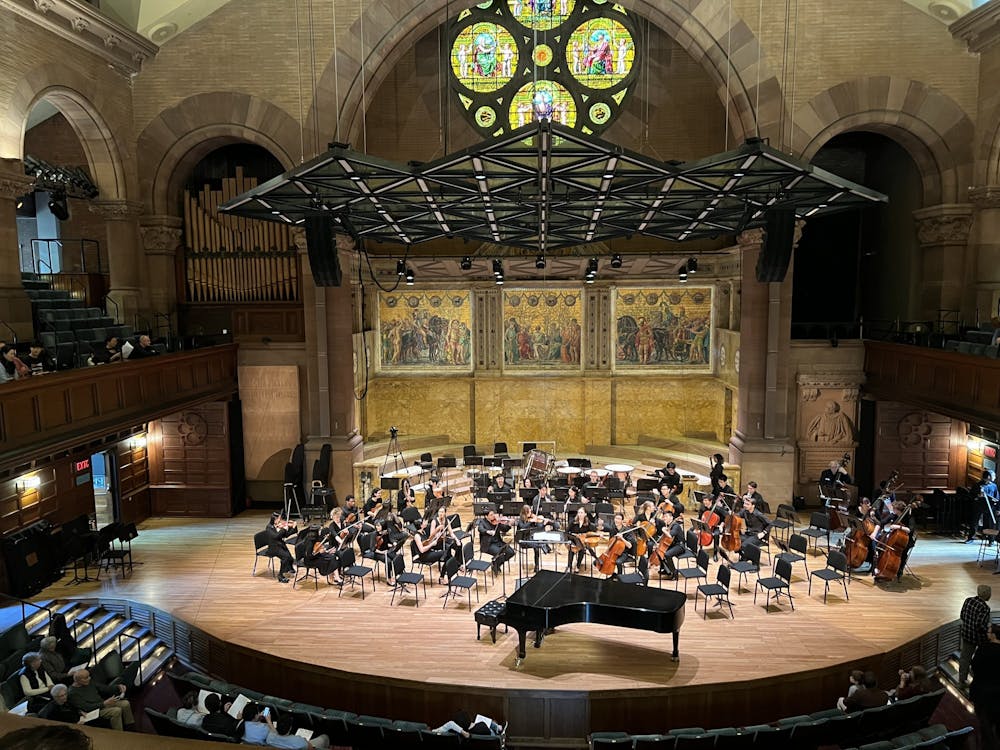The Princeton University Orchestra (PUO) took the stage at Richardson Auditorium on April 22 and 23 for a stunning performance. The auditorium was full of Princeton students, locals, and visitors as the musicians warmed up, tuned instruments, fiddled with sheet music, and rearranged chairs. With the dim of the lights, the audience was swept away by a transformative, 2.5-hour performance by PUO.
The performances of the weekend were showcased at the Stuart B. Mindlin Memorial Concerts and conducted by Michael Pratt, the official conductor of the PUO and director of the Certificate Program in Music Performance.
The program was divided into three pieces, the first of which was Felix Mendelssohn’s “The Hebrides” Op. 26, led by student conductor Yuqi Liang ’23. “The Hebrides” began with emotive, dramatic notes, and the power of the orchestra performing together was apparent. The brasses, strings, and percussion complemented each other and produced an evocative complexity of sounds that fully immersed the audience in the piece. Liang deftly conducted throughout “The Hebrides” with thoughtful, controlled movements, and he received several rounds of enthusiastic applause for his work afterward.
After a few moments of rearranging the stage for the next piece, Pratt resumed his role onstage for Concerto for Violin, Cello, and Piano Op. 56 by Ludwig van Beethoven. The second piece, composed of three movements, heavily featured the work of soloists: Myles McKnight ’23 on violin, Robin Park ’23 on cello, and Kimberly Shen ’24 on piano. The Beethoven piece highlighted what I find to be both so beautiful and difficult about classical music, as the soloists struck a balance of sound between precision and emotion. McKnight, for example, swayed to the music, producing both careful and evocative sounds. Park’s connection to his instrument showed in his deep concentration and precise notes. Shen played fully and emotively, and the grand piano became an essential part of the depth and creativity of the piece.
Before beginning the final piece, Pratt stopped to thank the audience and discuss the growth of the orchestra over the past year. He then described the impact of the seniors on the orchestra and the loss that the ensemble would bear without them next year. Since I attended the Sunday concert, that afternoon’s performance was particularly special, as it was the very last time that the seniors would play for PUO. In the bittersweet moment that followed, PUO took time to honor the seniors by naming each of them and providing them with a rose. It was perhaps even more emotional than the music played that day — musicians embraced across instruments, tears were shed, and one person set off a small can of confetti onstage in celebration of the seniors. The intermission to honor the seniors was also a reminder that the PUO is a student group. Even though the musicians sound professional, practice religiously, and perform in spectacular venues, they are still a campus organization and therefore a community. The quiet giggles between pieces and the heartfelt exchanges with seniors were a clear reminder of their close-knit group.
The PUO then reminded the audience of their extreme talent as an orchestra by launching into the final piece, a five-part epic by Richard Strauss called “Ein Heldenleben,” or “A Hero’s Life.” This final piece was dynamic and dramatic. The percussion evoked notions of battle scenes, with the trumpets heard off-stage — at one point, three trumpet players discretely snuck off the stage into the hallway — further immersing the audience in the world of the piece. The musicians all played wonderfully, creating moments of quiet delicacy quickly followed by the intensity of the orchestra. The performance, despite its delineation across five parts, was fluid, and I felt lost in the music, orchestra, and concert. In other words, I had no idea that over two hours had elapsed by the time the entire performance concluded.
The Princeton University Orchestra had an incredible weekend of performances, bringing a vivacious, emotive look into classical music.
Isabella Dail is a first-year and an associate editor for The Prospect at the ‘Prince.’ She can be reached at id7289@princeton.edu.








